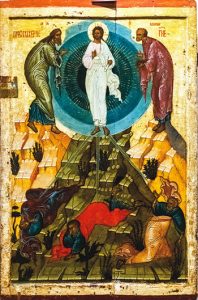A School for Prayer (22) – Spiritual Guidance (1 of 5)
The ancient tradition of the spiritual life
By Fr Craig Larkin sm, 1943 - 2015
Who will guide me on the journey?
The tradition of Spiritual Accompaniment
If we are climbing a mountain for the first time, or making a sea-journey for the first time, we need to have with us, as a companion and guide, someone who has gone there before us and knows the way; someone who can recognise the landmarks, and can help us to avoid the pitfalls and dangers on the way.
We need the same help in our journey through life, especially in the now well-known ‘mid-life crisis’:
In the middle of the journey of life I came to myself,
in a dark wood where the direct way was lost.
I cannot rightly say how I entered it.
I was so full of sleep,
at that point where I abandoned the true way.
Dante Alighieri, ‘The Divine Comedy’
And in our journey to God in prayer, we need a guide who knows the territory from personal experience, who can help us to recognise the landmarks, who can help us recognise what are small stumbling blocks and what are real life-threatening dangers, who can help us to take what we need for the journey, so that we can make our own way in prayer.
From the beginning, the Desert Fathers and Mothers insisted on the need for a guide:
• to ensure that the disciple was walking in humility
• to save the disciple from self-deception
• to help the disciple to be sure-footed in the journey.
The old men used to say, “If you see a young monk climbing up to heaven by his own will, grab him by the feet and pull him down: this will be good for him”.
The Desert Fathers
There is one thing more important than all possible books and ideas, and that is the example of an Orthodox staretz, before whom you can lay each of your thoughts and from whom you can hear, not a more or less valuable private opinion, but the judgement of the Holy Fathers.
Ivan Kireyevsky
The Desert tradition calls this guide an Abbaor Amma (spiritual father or mother); the Greek uses the term geron (elder); the Russian tradition uses the title staretz (wise person); the Celtic tradition uses the name anam cara (soul-friend); a Western tradition uses the words spiritual director.
Different traditions, different titles, but all are rooted in the tradition of the Desert.
The essential elements of spiritual direction are found in the experience of the monks of the desert.
What is essential to anyone who has the task of spiritual direction is he/she has made, and is making, his/her own journey, and is recognised to have gifts of wisdom, discernment, and love.
Features of Desert Spirituality / Anthropology
The Christian anthropology of the Early Church
To understand better the vocation of the Abba or spiritual guide in the early Church, recall the essential elements of the Church’s understanding of the human person in relation to God:
Image and Likeness
Every human being is created in the image and likeness of God (Genesis 1:26).
The likeness of God can be lost – through sin – and can be restored – through grace, conversion and asceticism.
The ultimate goal of every human being is to restore the likeness of God within us. “God became man so that man can become God” (St Athanasius).
Theosis - divinisation
This restored state is called ‘divinisation’ or ‘theosis’. The early Church – and the Eastern Church today – interprets this in quite a literal way. The Icon of the Transfiguration reflects the belief that while Jesus was transfigured, so were the three apostles who witnessed the Transfiguration.
While this divinisation is a work of grace, it also involves human effort. This is called askesis or asceticism.
Askesis - asceticism divinisation
Positive asceticism is the task of practising and making a habit of virtues: faith, hope, charity, prudence, justice, fortitude, temperance, etc.
Negative asceticism is the task of struggling against the vices: anger, greed, pride, lust, etc.; and of making a habit of self-renunciation and self-transcendence.
Logismoi – thoughts
Evagrius of Pontus says that the chief sources of trouble for any struggling Christian are our thoughts, logismoi.
Logismoi are like uncontrolled ideas or spontaneous thoughts that rise up without invitation in our head, that roam around in our mind freely, and which if not checked can lead us to inappropriate actions or sins. But in themselves, at the beginning, they are neither good nor bad; they are just thoughts.
But these thoughts or logismoi tell us what our deepest desires might be, and where we are most vulnerable. They are like the ‘cracks in our heart’. If we watch where these thoughts come from, when they come to us, and where they lead us, we will gain a deep insight into where God is working in us.
The disciple and the Master: “Give me a word by which I may be saved!”
When a disciple went into the desert to find God, the first thing he wanted to know was “What do I do now that I’m in the desert?”
The second thing he wanted to know, when he became aware of the struggle inside himself, was: “What can I do about the battle that’s going on inside me?” or “How can I find a way to restore the image and likeness of God within me?”; or, in other words, “How can I be saved and come to fullness of life?”
This is why the most frequent request a disciple made to his Abba was “Give me a word by which I may be saved!”
The Abba’s reply was usually something like:
• Stay in your cell!
• Watch yourself!
• Be attentive!
• Do not judge!
The most frequent advice was:
• Watch yourself!
• Be attentive!

Desert Mothers Saint Paula and her daughter Eustochium with their spiritual advisor, Saint Jerome. Francisco de Zurbarán, c. 1639, National Gallery of Art, Washington DC
The task of the disciple was to be aware of what was happening inside himself; and then to reveal his logismoi; to tell his Abba what thoughts were going through his mind; what thoughts kept coming back; where these thoughts led him in his imagination; what he did about his thoughts. This was called exomologesis.
The task of the Abba was to 'read' these logismoi; to find out what caused them, to help the disciple to accept, or direct, or control, or discipline them. This was called discernment or diakrisis.
So, the disciple needed humility to enable him to reveal his thoughts to his Abba without embarrassment.
The Abba needed discernment to ‘read’ these thoughts; wisdom to know what the disciple should do with them; and the personal experience of having dealt with his own 'demons'.
 Entries(RSS)
Entries(RSS)